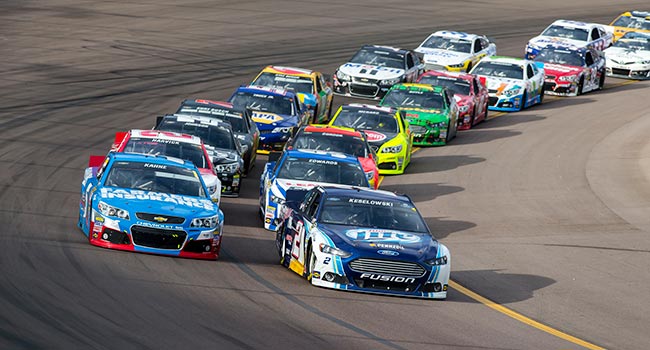On a blistering last day of winter at Phoenix International Raceway, slick racing conditions helped showcase NASCAR’s new points system, designed to emphasize aggressive competition and strategy.

The hot track in Sunday’s Camping World 500 led to a variety of different leaders and a dramatic finish in the Monster Energy Cup Series race.
Joey Logano and Chase Elliott showed dominance early on, before ultimately fading and finishing 12th and 31st, respectively.
That opened the door for Kyle Busch, who dominated much of the second half, only to have a caution fly late and force a green-white-checkered finish, where a gutsy call by Ryan Newman’s crew chief handed him the win.
Luke Lambert decided to have his driver stay out under the caution instead of coming in for the two tires Newman requested.
“It was the best call for us,” Lambert said. “I thought it was the only opportunity we had to win the race.
“I felt like doing it was going to yield a better result than the other option so ultimately that was the weighted decision and I told him (that). He said he could make the car wide and obviously he did.”
Clean air and a good restart on old tires paved the way for Newman’s first victory since the Brickyard 400 in July of 2013.
Not only was it a drought-ending race for Newman but a drought ending race for Richard Childress Racing, as the group hadn’t won a race as a team since Kevin Harvick’s victory at Phoenix in November of 2013.
Four races into the 2017 NASCAR schedule, the impact of the rule changes made after last season are clearer.
The sport decided to make another significant change to its points system by emphasizing how drivers perform over the course of a race and not just their finish.
NASCAR divides the scoring into three segments: Stage 1, Stage 2 and the Final Stage, and points are awarded based on where drivers finish at the end of each segment.
A driver who finishes first in either Stage 1 or Stage 2 will receive 10 race points and one playoff point. The driver who finishes second will receive nine race points, the driver who finishes third will receive eight and down to one point for 10th place.
So even as Newman took home Sunday’s biggest prize, three drivers were actually winners Sunday afternoon.
Logano controlled Stage 1 of the race, leading 74 of the initial 75 laps and took home the Stage 1 victory and a coveted playoff point.
Elliott used a daring move to grab the lead late in Stage 2 and secure the stage victory for his team, which also marked the first stage win for Chevrolet this season.
Ultimately, even with the small victories made by Logano and Elliott, there was only one true race winner, and for Lambert, that is what makes NASCAR so tough and entertaining.
“One of the things that’s really challenging about this sport is, there’s only one winner every week,” he said. “I always describe it as it’s a championship every single Sunday.
“You’re racing against the entire series, the entire group of competitors. It’s not like any other standard sport where you face one competitor and you have a 50-50 set of odds at winning or losing. You have a one-in-40 chance of winning any given Sunday against all of the best.”
By Christopher Whitcomb, Cronkite News




